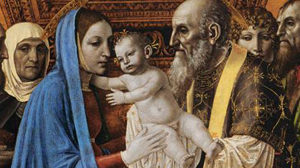Feast of the Presentation of the Lord
Scripture:
Malachi 3:1-4
Hebrews 2:14-18
Luke 2:22-40
Reflection:
In our reading of the Scriptures, especially the Gospels, we probably associate some of the parables, or the infancy narratives, or the account of the events of Holy Week, with our own personal piety and devotion. Some biblical passages resonate in our experience and in our hearts more than others.
Who can read the infancy narratives of the gospel of Luke and not feel the wonder of the shepherds at the birth of a redeemer King? Or who can read the events surrounding the Sermon on the Mount, with its proclamation of the Beatitudes, and not feel challenged to be more loving, patient and forgiving of one’s neighbor? Or who can read the events of the Passion Narratives, and not feel the sorrow of a family experiencing the imminent death of one of them?
For me, the passage of the Presentation of the Child Jesus in the Temple is the clearest and most compelling affirmation of the value of life (yes, you may substitute “pro-life” here) that the Scriptures offer us.
This passage profoundly and reverently gathers together the wisdom of age, the aspirations of a young family, and the religious traditions that give value to the life and days of each member of the scenario.
Jesus is helpless; he is carried in the arms of his father and mother to be presented in the Temple, along with the ritual offering which entitles the parents to bring him home and raise him, that he may “grow in wisdom and age.”
Helpless though he may be, totally dependent on his parents for his survival, he is, nevertheless, the promised and covenanted savior. It is he who, nestled in the womb of his mother, was carried to the house of Elizabeth, and introduced to her unborn child, who is John the Baptist, and who is said to have lept for joy at the pre-natal encounter with Jesus.
Now, in the gospel passage, forty days after his birth, he is brought to the Temple for a ritual that acknowledges that all life comes from God, and all beings belong to the Lord, more than to their parents. Hence, the ritual includes the symbolic “ransom” of the child through the prescribed offering, so that the parents may return with the child to their home.
Surely Mary is re-living all that has happened to her in the past year. The visit from the Angel Gabriel, the fear that Joseph might repudiate her; the validation of her “yes” to God’s in the eventual birth of her child. And Joseph, the stalwart, faith-filled man of honor, who takes Mary as his wife, with only a remembered dream upon which to base his life-long fidelity to his cherished fiancee.
But they are not alone in the temple. Simeon and Ana each have special roles to play in the narrative of the Presentation. Simeon is an old man, but the Holy Spirit was upon him; and he had been promised by God that he would not die until he had welcomed the Savior that all of Israel had anticipated. That moment had arrived, his life was fulfilled in its old age.
Ana, an old woman, a widow, and someone who had spent her widowhood waiting for the Savior of Israel to appear recognizes in the child Jesus the fulfillment of her life’s greatest hopes. …she gave thanks to God and spoke about the child to all who were awaiting the redemption of Jerusalem.
Ana, an old woman, begins the Church’s perennial mission of evangelization; she goes about speaking “about the child to all who were awaiting the redemption of Jerusalem.”
There is no stage of life that is removed from the divine plan of salvation. God’s purpose is calling us into life is for the sake of the redemption of the world. No one is exempted from this finality.
The recently born child Jesus, the mother who bore him in her womb, the father who accepted the responsibility of fatherhood, the senior citizens of the Temple crowd who were able to see in the ordinariness of this one couple with their child, the fulfillment of God’s plan for the people—it all speaks of the importance of each life in the design of God’s plan for the human family.
The human family has always been able to justify the taking of human life. There is nothing godly about that. It is the willingness to accept all human life, whether unborn, born, prospering or dying as the medium of God’s presence among us, that sets us apart from those for whom a new life is an inconvenient incursion into my carefully laid plans for myself.
As long as the taking of any human life, whether unborn, just-born, young, middle-aged or old, bothers us, disturbs our tranquility and drives us to look for alternatives to such a decision, and for ways to heal those who have felt the compulsion to make such decisions, we are not far from the Kingdom of God.
Fr. Arthur Carrillo, C.P. is the director of the Missions for Holy Cross Province. He lives in Chicago, Illinois.
